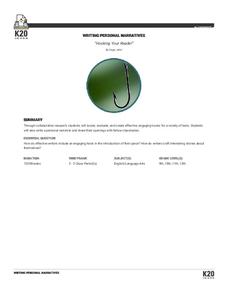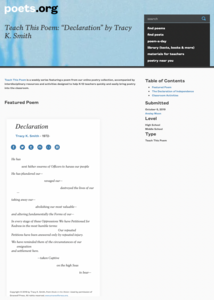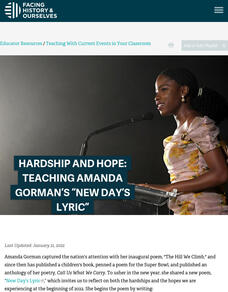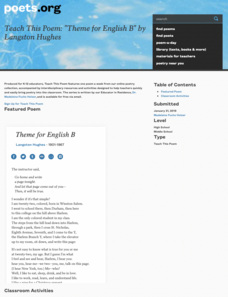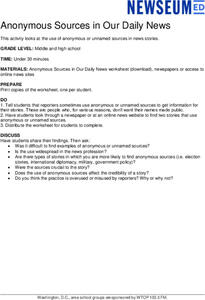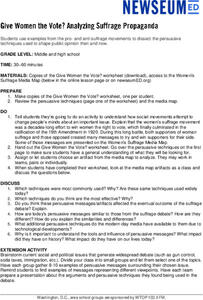National Endowment for the Humanities
Dramatic Perspective in Moby Dick
A lesson on Herman Melville's Moby Dick asks readers to compare the first person point of view of Ishmael in Chapter 1 to Captain Ahab's dramatic monologue in Chapter 37. Readers cite evidence from the chapters to support their analysis...
National Endowment for the Humanities
Narrative Voice in Moby Dick
Call him a reliable narrator! Ishmael is the focus of a lesson that asks readers to analyze the complex character of Herman Melville's narrator as he is introduced in the first chapter of Moby Dick.
National Endowment for the Humanities
Themes in Lord of the Flies
William Golding's Lord of the Flies is the anchor text for a lesson that teaches readers how to distinguish between a literary topic and a literary theme. Using the provided worksheets, groups first chart some themes and propose a...
National Endowment for the Humanities
Characterization in Lord of the Flies
Readers of Lord of the Flies hunt down direct and indirect examples of how William Golding brings his characters to life. After instructors guide learners through the process of collecting evidence of these two types of characterization...
National Endowment for the Humanities
Symbolism in Lord of the Flies
Readers of Lord of the Flies examine the four main symbols William Golding develops in his novel: the island, the conch, the Lord of the Flies effigy, and fire. Partners select one of the major symbols and create an image by adding words...
Learning for Justice
Marian Wright Edelman
Marian Wright Edelman's 2014 Commencement Speech at Lewis and Clark College serves to inspire young scholars to investigate a problem in their community, to determine why the problem is important, and then to develop a plan for one thing...
Learning for Justice
Mary McLeod Bethune
Young historians conduct a close reading of the text of an interview with Mary McLeod Bethune, the daughter of former slaves who taught herself to read, grew up to establish schools for other Black women, and went on to become an advisor...
Newseum
Is It Fair?
Young journalists learn how to analyze word choice, context, and counterpoints to judge the fairness of a news story. They practice using these tools to judge a series of headlines for the story of Goldilocks and the Three Bears. They...
Learning for Justice
Mary Church Terrell
Excerpts from an 1898 speech by civil rights activist Mary Church Terrell offers young scholars an opportunity to investigate how Black American women fought for civil rights long before Rosa Parks and the civil rights movement of the...
Learning for Justice
Maya Angelou
Maya Angelou's poem, "Still I Rise", offers young scholars an opportunity to consider how poets use literary devices to create powerful messages. After a close reading and discussion of the poem, class members reflect on how they can...
K20 LEARN
Hooking Your Reader
Hook your class into inquiry-based, hands-on learning with a activity on narrative leads. Pupils research different types of hooks and decide which one to use in their own writing. Carefully scaffolded to include all learners, the...
Academy of American Poets
Teach This Poem: "A New National Anthem" by Ada Limón
Ada Limon's poem, "A New National Anthem," offers young scholars an opportunity to reflect on the significance of the US national anthem and the extent to which Key's vision applies to all Americans. After watching a video of Whitney...
Academy of American Poets
Teach This Poem: “Declaration” by Tracy K. Smith
Tracy K. Smith's erasure poem "Declaration" challenges scholars to use their noticing skills to make connections between an engraving entitled "The Declaration of Independence" and Smith's poem. Class members record observations and...
Academy of American Poets
Teach This Poem: "A Place in the Country" by Toi Derricotte
Build young scholars' confidence in analyzing art and poetry with a lesson plan that first asks pupils to list details they notice in Edouard Vuillard's painting "Garden at Vaucresson" and then to describe how the painting makes them...
Academy of American Poets
Teach This Poem: "Imagine" by Kamilah Aisha Moon
A lesson about Kamilah Aisha Moon's poem "Imagine" asks young scholars to imagine, "What would happen if...?" If Dr. Martin Luther King's dream became a reality. If Renisha McBride was a white girl and crashed her car in a black...
Academy of American Poets
Teach This Poem: "Old South Meeting House" by January Gill O'Neil
The vaulted ceiling of the Old South Meeting House has heard many voices. Young scholars read an excerpt about its importance in American history and then do a close reading January Gill O'Neil's poem, "Old South Meeting House." After...
Facing History and Ourselves
Hardship and Hope: Teaching Amanda Gorman's "New Day's Lyric"
Class members come together to study Amanda Gorman's poem "New Day's Lyric." After a close reading of the poem, learners watch a video of Gorman reading her poem, and then craft additional lines for the poem where they offer suggestions...
Academy of American Poets
Teach This Poem: "On Being Brought from Africa to America" by Phillis Wheatley
Phillis Wheatley's poem, "On Being Brought from Africa to America" is the focus of a lesson that asks readers to consider how the poem is a critique of slavery. Groups comprise a list of words and phrases they notice as well as questions...
Academy of American Poets
Voice
Four lessons make up a poetry unit that introduces high schoolers to spoken and written poetry. Class members also examine poems as social commentary and connect these poems to various novels and plays. A great way to incorporate poetry...
Academy of American Poets
Teach This Poem: "Theme for English B" by Langston Hughes
Langston Hughes' "Theme for English B" is featured in a lesson that asks pupils to first read a biography of Hughes and list things about his life they think are important. The class then reads the poem and compares what they learned...
Newseum
Bias Through History: Analyzing Historical Sources
Young journalists use the E.S.C.A.P.E. (evidence, source, context, audience, purpose, and execution) strategy to evaluate historical and contemporary examples of bias in the news. The class then uses the provided discussion questions to...
Newseum
The Press and the Presidency: Friend or Foe? How the President Is Portrayed
In theory, news reports should be fair and unbiased. Young journalists test this theory by selecting a current news story covered by various media outlets about the President of the United States. They then locate and analyze five...
Newseum
Anonymous Sources in Our Daily News
Young journalists search for two examples of news stories, either published or online, that use anonymous or unnamed sources. They then consider the possible motives for why the sources remain unidentified, the types of stories that use...
Newseum
Give Women the Vote? Analyzing Suffrage Propaganda
Propaganda is often used to shape public opinion. Scholars investigate the persuasive techniques used by the pro- and anti-suffrage movements. Groups compare how these devices were used during the suffrage movement with how the same...












